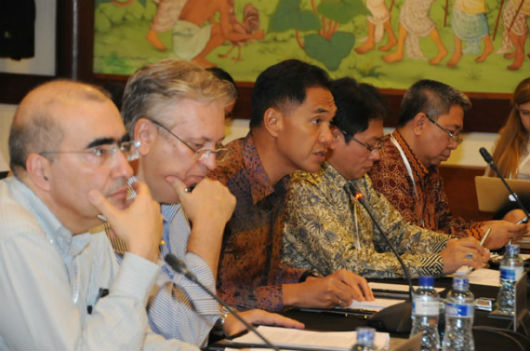G-20 Urges Developed Countries to Promptly Eliminate Export Subsidies
Bali, 2 December 2013 – Indonesia and Brazil, which are both members of the World Trade Organization’s G-20, urged developed countries to eliminate export subsidies and other subsidies in the agricultural sector as was mandated in the WTO agreement on agriculture.
The G-20 has been striving for more than 10 years to voice the elimination of export subsidies in the agricultural sector, which developed countries are practicing, because they are considered as having distorted world agricultural trade.
“This meeting is a crucial one for the G-20 which aims to review the development of trade policies in agriculture, to consolidate the position of the G-20 in the WTO MC9 in Bali as well as to determine the direction and means necessary to be taken by the G-20 to advance and finalize negotiations in agriculture after Bali meeting,” said the Minister of Trade Gita Wirjawan.
Since the G-20 was declared in 2003 at the WTO headquarters in Geneva, they have been consistent in urging developed countries to finalize the Doha Round, which began in 2001, in accordance to the Doha mandate. For the G-20, the need to change the regulations in the agricultural sector still remains to be the most important and urgent issue to be resolved by the WTO, considering the agricultural subsidies are one of the protectionism tools in international trade.
“For Indonesia, the elimination of trade barriers in the agricultural sector, which is caused by the subsidy of agricultural product exports in developed countries, is one of the targets to be achieved in multilateral trade fora,” added the Trade Minister.
G-20 deeply regretted the delay in eliminating all forms of export subsidies as mandated in the 2003 WTO Ministerial Declaration in Hong Kong. The G-20 re-emphasized that export subsidies are policies that strongly distort international trade.
The Trade Minister asserted that the G-20 is waiting for developing countries to take concrete measures to eliminate all forms of export subsidies; therefore, the agricultural sector must be a central focus in the post-Bali Doha negotiations.
Furthermore, Trade Minister Gita Wirjawan emphasized how important it is that the Bali Package is agreed on to reinvigorate the success of all the issues of the WTO’s Doha Round of negotiations. “Success to finalize the Bali Package at the Ministerial Conference will send out a strong signal to the world that members of the WTO still have the capacity to achieve results in trade negotiations in the multilateral fora,” he added.
To anticipate post-Bali negotiations, the G-20 has agreed to be involved in negotiations that are constructive and more pragmatic so as to reach a commitment that binds developed countries to eliminate export subsidies and discipline all agricultural subsidy policies that affects agricultural trade.
Djunari Inggit Waskito
Director of Multilateral Cooperation
Ministry of Trade


